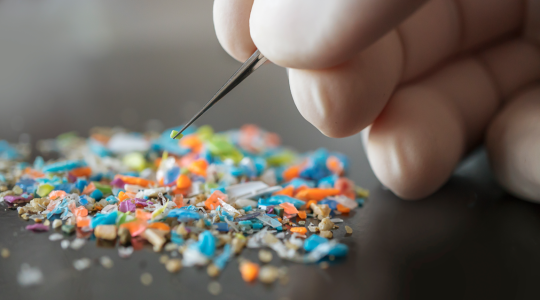Exposed: The Shocking New Body Part Found to Be Polluted with Microplastics - Are You at Risk?
By
- Replies 3
In a world where the convenience of plastic is juxtaposed with its environmental and health impacts, recent studies have unearthed a new cause for concern that hits closer to home than ever before. Microplastics, the tiny fragments of plastic that have infiltrated our oceans, air, and now, alarmingly, our bodies, have been discovered in a place that may surprise many – the olfactory bulb, a critical part of our brain associated with the sense of smell.
This startling discovery was made by researchers from the University of São Paulo in Brazil, who found that these microplastics could potentially create a direct pathway for harmful particles to enter the brain. The study, published in the journal Environmental Health, raises the spectre of microplastics not just as an environmental pollutant but as a silent invader of our most intimate biological sanctuaries.
But how did these microplastics end up in such a worrying new body part? The researchers suggest several possibilities: they could have travelled there through systemic circulation, been inhaled through the respiratory pathway, or even crossed the blood-brain barrier – a protective shield designed to keep harmful substances away from our brain tissue.
The implications of this are profound. Microplastics, which are fragments of any plastic less than five millimetres in length, are known to cause whole-body inflammation, neurological effects, DNA damage, and a weakened immune response when they accumulate in the body. The presence of these particles in the olfactory bulb suggests a potential for direct impact on brain health, although the full extent of this impact is yet to be determined.
In the same vein, a separate study led by the Food Packaging Forum Foundation in Switzerland has identified a staggering 3,601 toxic chemicals in everyday food packaging items such as Tupperware, water bottles, and canned goods. These chemicals, which include Bisphenol A (BPA) and heavy metals, have been linked to cancer, reproductive problems, and other serious health issues. Alarmingly, these substances were found in human blood, urine, hair, and breast milk, indicating that they are seeping into our bodies through the very containers we use to store and heat our food.
The study, published in the Journal of Exposure Science & Environmental Epidemiology, highlights the pervasive nature of these chemicals and the inadequacy of current regulations. With 25 per cent of the 14,000 chemicals used in packaging largely unregulated, the potential for harm is significant. The researchers' findings underscore the need for more stringent controls and greater awareness of the risks associated with food packaging.
As seniors, we must be particularly vigilant. Our bodies may be less efficient at processing and eliminating toxins, and we may have accumulated more exposure over our lifetimes. It's essential to consider the containers we use for our food and to minimise our reliance on plastics, especially when heating food in microwaves or storing acidic or fatty foods that can cause chemicals to leach more readily.
The discovery of microplastics in the olfactory bulb is a wake-up call, reminding us that the choices we make in our daily lives have far-reaching consequences for our health and the environment. It's a call to action for individuals, industry, and regulators alike to reassess our relationship with plastic and to seek safer, more sustainable alternatives.
 As members of the Seniors Discount Club, we encourage you to share your thoughts and experiences. Have you made changes to reduce your exposure to plastics and toxic chemicals? What alternatives have you found to be effective? Join the conversation, and let's navigate this plastic-laden world together, armed with knowledge and a commitment to our health and the planet.
As members of the Seniors Discount Club, we encourage you to share your thoughts and experiences. Have you made changes to reduce your exposure to plastics and toxic chemicals? What alternatives have you found to be effective? Join the conversation, and let's navigate this plastic-laden world together, armed with knowledge and a commitment to our health and the planet.
This startling discovery was made by researchers from the University of São Paulo in Brazil, who found that these microplastics could potentially create a direct pathway for harmful particles to enter the brain. The study, published in the journal Environmental Health, raises the spectre of microplastics not just as an environmental pollutant but as a silent invader of our most intimate biological sanctuaries.
But how did these microplastics end up in such a worrying new body part? The researchers suggest several possibilities: they could have travelled there through systemic circulation, been inhaled through the respiratory pathway, or even crossed the blood-brain barrier – a protective shield designed to keep harmful substances away from our brain tissue.
The implications of this are profound. Microplastics, which are fragments of any plastic less than five millimetres in length, are known to cause whole-body inflammation, neurological effects, DNA damage, and a weakened immune response when they accumulate in the body. The presence of these particles in the olfactory bulb suggests a potential for direct impact on brain health, although the full extent of this impact is yet to be determined.
In the same vein, a separate study led by the Food Packaging Forum Foundation in Switzerland has identified a staggering 3,601 toxic chemicals in everyday food packaging items such as Tupperware, water bottles, and canned goods. These chemicals, which include Bisphenol A (BPA) and heavy metals, have been linked to cancer, reproductive problems, and other serious health issues. Alarmingly, these substances were found in human blood, urine, hair, and breast milk, indicating that they are seeping into our bodies through the very containers we use to store and heat our food.
The study, published in the Journal of Exposure Science & Environmental Epidemiology, highlights the pervasive nature of these chemicals and the inadequacy of current regulations. With 25 per cent of the 14,000 chemicals used in packaging largely unregulated, the potential for harm is significant. The researchers' findings underscore the need for more stringent controls and greater awareness of the risks associated with food packaging.
As seniors, we must be particularly vigilant. Our bodies may be less efficient at processing and eliminating toxins, and we may have accumulated more exposure over our lifetimes. It's essential to consider the containers we use for our food and to minimise our reliance on plastics, especially when heating food in microwaves or storing acidic or fatty foods that can cause chemicals to leach more readily.
The discovery of microplastics in the olfactory bulb is a wake-up call, reminding us that the choices we make in our daily lives have far-reaching consequences for our health and the environment. It's a call to action for individuals, industry, and regulators alike to reassess our relationship with plastic and to seek safer, more sustainable alternatives.
Key Takeaways
- Scientists have identified a vast array of toxic chemicals, including Bisphenol A (BPA) and heavy metals, in common food packaging, which have been linked to adverse health effects like cancer and reproductive issues.
- The chemicals from food packaging materials seep into food and are subsequently found in human blood, urine, hair, and breast milk, highlighting extensive human exposure.
- A separate study discovered microplastics in the olfactory bulb, suggesting a potential pathway for these plastics to enter the human brain, although their effects remain uncertain.
- Experts emphasise the significance of the unregulated chemicals in packaging, cautioning about the direct health implications and the need for more research into the impacts of microplastics on the body.








